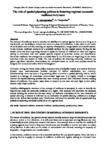| dc.description.abstract | The concept of resilience aims to describe the stability of a system against short-term or long-term interference, and its ability to recover and return to a state of equilibrium. It also refers to the notion of reorientation and renewal, meaning the capacity of adaptation, reorganisation and transformation. In this context, resilience seems to be a desirable attribute for any spatial system. During the last decade, there has been a growing interest to apply the concept of resilience to cities and regions, aiming to understand how such spatial systems respond to economic shocks and disturbances. Economic resilience has emerged as a crucial issue in the EU since the beginning of the recent economic crisis that started in 2008. The role of policies for fostering economic resilience has gained significant attention. Nevertheless, the principles based on which such policies should be designed and pursued are still a field of investigation.
In Greece, during the recent crisis, policy responses were principally enacted at a national level and focused upon macroeconomic policies intended to deliver stabilization and recovery. Simultaneously, there has been a long-standing effort to endorse a spatial planning reform, which resulted to a barrage of, sometimes controversial, legal acts. It is highly critical to investigate whether the spatial planning policies that were recently pursued have orientated towards shaping factors of resilience. The present paper aims to respond to this issue and shed light to how policy context helps shape resilience.
Initially a bibliographic overview of the concept of resilience is attempted in order to identify the features that shape the economic resilience of a region. This research will determine the adequate criteria forming the context for the case study. An inclusive description of the new directions of spatial planning in Greece is followed by an evaluation of spatial planning policies at a strategic level in the Athens Metropolitan area. Conclusions will cover the possible role of spatial planning policies in achieving economic resilience at the regional level. | en |


